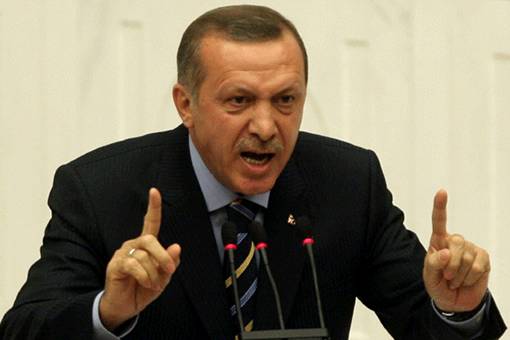Turkey Analysis: Syria and Barzani Unsettle Ankara's Official Policy on Kurdistan
 Prime Minister ErdoganThe ruling Justice and Development Party's policy giving economic and political support to the Iraqi Kurdistan Regional Government has had several objective. It has sought a buffer against Nuri al-Maliki's Iraq, along Bashar al-Assad's Syria - and Iran, as well as dealing with the Kurdish issue inside Turkey. And as KRG President Masoud Barzani became the man of the region, Washington's attention could be pulled back to the area.
Prime Minister ErdoganThe ruling Justice and Development Party's policy giving economic and political support to the Iraqi Kurdistan Regional Government has had several objective. It has sought a buffer against Nuri al-Maliki's Iraq, along Bashar al-Assad's Syria - and Iran, as well as dealing with the Kurdish issue inside Turkey. And as KRG President Masoud Barzani became the man of the region, Washington's attention could be pulled back to the area.
Ankara wants an alternative to the proposal of the imprisoned leader of the Kurdistan Workers' Party (PKK), Abdullah Ocalan, for an end to bloodshed through his release from prison and return to politics. Instead, Barzani would play Kurdish big brother, as Leyla Zana, a deputy of the opposition Peace and Democracy Party (BDP), challenged perceptions of the Kurdish issue.
Zana failed, however, and had to reiterate the existing BDP line in a meeting with Prime Minister Recep Tayyip Erdogan: the move of Ocalan from prison to house arrest, the right of education in mother language, and political dialogue with a halt to military operations.
At the "Friends of Syria" meeting in Istanbul in April, Syrian Kurds were not convinced; indeed, they were isolated because their autonomy demands were not on the agenda. The election of Kurdish Abdelbasset Sayda as the new leader of the opposition Syrian National Council had not made up for this concern. Last week, Barzani took the initiative and gathered the leaders of the People's Assembly and Kurdish National Council and encouraged them to sign the Hewler Agreement which establishes a High Kurdish Council for the unity of Syrian Kurds.
The PKK and Barzani have refreshed their understandings, so this will be the official end of PKK militia fighting for President Assad. In return, the PKK will be recognised as part of the political questions, witha a guarantee from Barzani that there will be no struggle between the faction and an assurance that Ocalan is the only leader of the Kurdish movement in Turkey.
Meanwhile, the PKK knows well that it should not launch an attack inside Turkey that could jeopardise this deal. Instead, the PKK and opposition BDP have a division of labour. The former have been blocking roads, intercepting drivers, pursuing propaganda, and setting trucks on fire in the southeastern provinces, while the latter has called Kurds in Diyarbakir to rally for the "freedom of Ocalan". The governership did not give permission for the rally, and thousands clashed with police on Saturday.
The Erdogan government will try to rely on a "security-first" agenda to challenge both the opposition parties and the PKK, at the same time promoting its synthesis of nationalism and Islam.
However, Ankara now has to review its calculation that playing the game with more players and more cards would turn the situation to its advantage. Both Barzani's involvement and the changing Syrian situation pose a question: what will Erdogan do if an autonomous Kurdish region is declared not only in Syria but in southeastern Turkey?

 Monday, July 16, 2012 at 8:31
Monday, July 16, 2012 at 8:31
Reader Comments